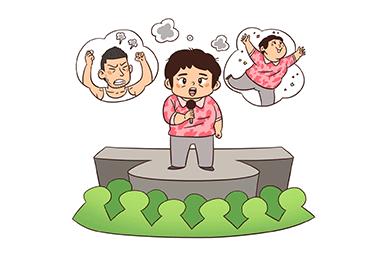Sanlian Lifeweek, a Beijing-based weekly: “Female stand-up comedians such as Wang Xiaoli and Fang Zhuren showcased brilliant performances drawn from their life experiences, fully embodying the essence of stand-up comedy as a genre, where humor becomes a force and stand-up comedy a weapon that reshapes power structures.” Source: Sanlian Life Magazine Sina Weibo
Zhejiang Xuanchuan, the official WeChat of the Zhejiang Provincial Publicity Department: “Some stand-up comedy shows have drifted from the essence of humor, repeatedly amplifying gender antagonism. The stage has been reduced from a place of lively idea exchange to a battleground brewing irrational emotions. Such tendencies do not foster mutual understanding but instead deepen gender divisions.” Source: Zhejiang Xuanchuan WeChat
Nanjing-based Yangtze Evening Post: “We look forward to more diverse female narratives. On one hand, comedians should continue portraying all facets of women’s lives, not only hardships, but also stories of growth, achievement and empowerment. On the other, they should go beyond gender issues, expanding creative horizons to explore life, society and culture more broadly.” Source: Yangtze Evening Post website
This summer, outspoken women have taken center stage in Chinese stand-up comedy. But it seems their jokes are not landing with everybody.
Women made up nearly 40 percent of all performers on two hit comedy variety shows, Tencent Video’s Stand-up Comedy and Friends Season 2 and iQiyi’s The King of Stand-up Comedy Season 2, which wrapped up on August 30 and September 6.
Their sets, clips of which have gone viral, spotlight female-centered issues, from relationships and virginity to body image, menstrual stigma, workplace inequality and sexual harassment.
Many celebrated their success as progress for women’s independence and liberation, applauding how comedians were bringing women’s issues into the public conversation. Others, however, argued that performers were leaning too heavily on gender conflict, accusing some of exaggerating or fabricating stories to stoke hostility.
Fang Zhuren, a 50-year-old woman from rural Shandong Province, emerged as one of the summer’s breakout stars. On The King of Stand-up Comedy Season 2, she told harrowing stories about her arranged marriage, unemployed and abusive husband, cruel in-laws, decades of domestic violence and eventual divorce.
But media investigations later revealed that parts of her narrative were false. The Jiemian News reported that Fang’s mother-in-law, whom she described as abusive, had died when Fang’s ex-husband was still a boy.
Experts and media outlets have urged female comedians to broaden their scope, suggesting they highlight not only women’s struggles but also stories of growth, success and joy, and to move beyond gender topics altogether in order to foster greater understanding between men and women.

 Old Version
Old Version